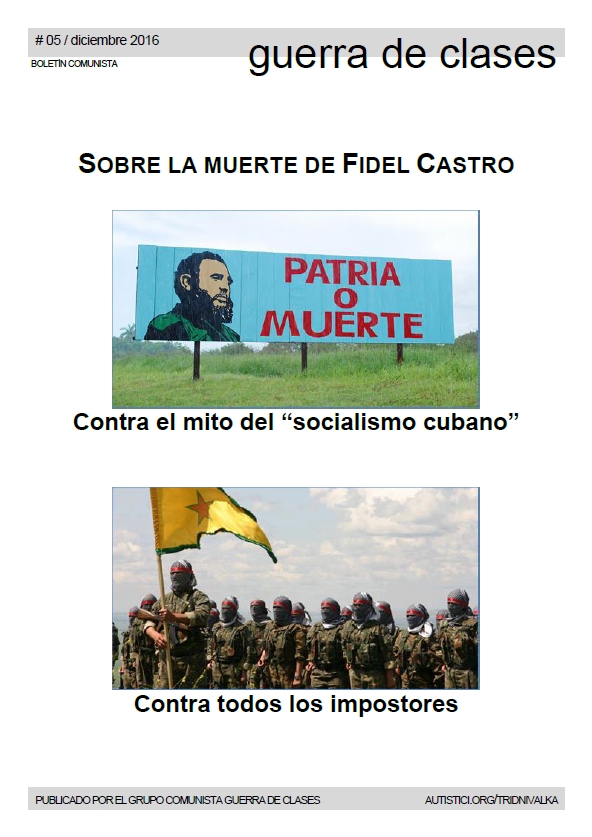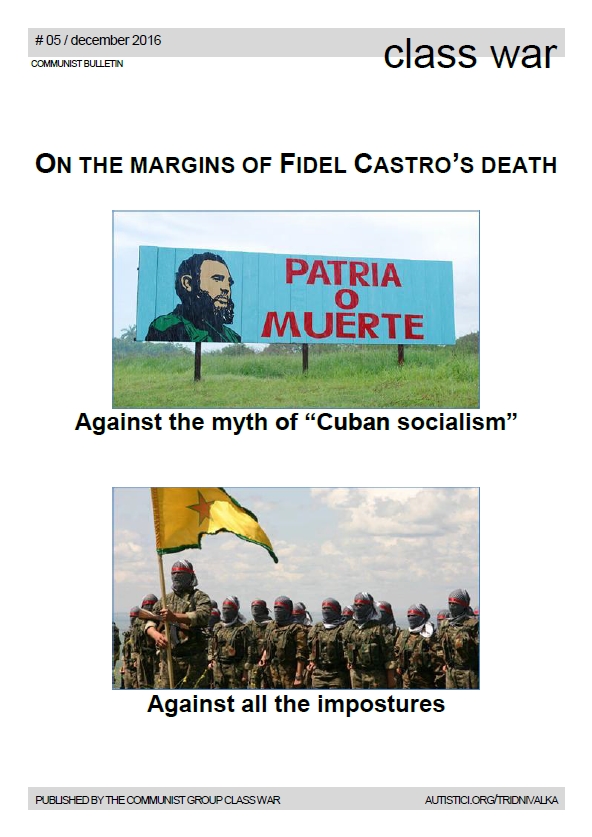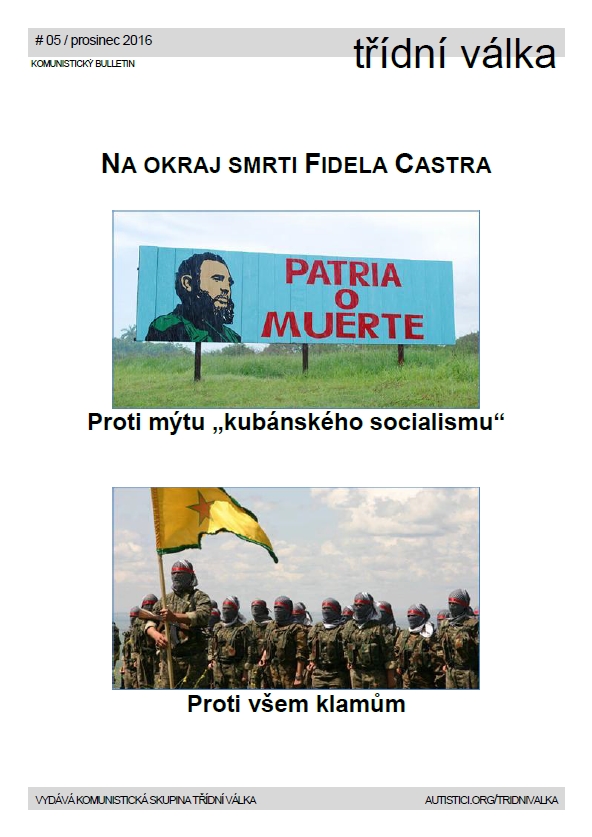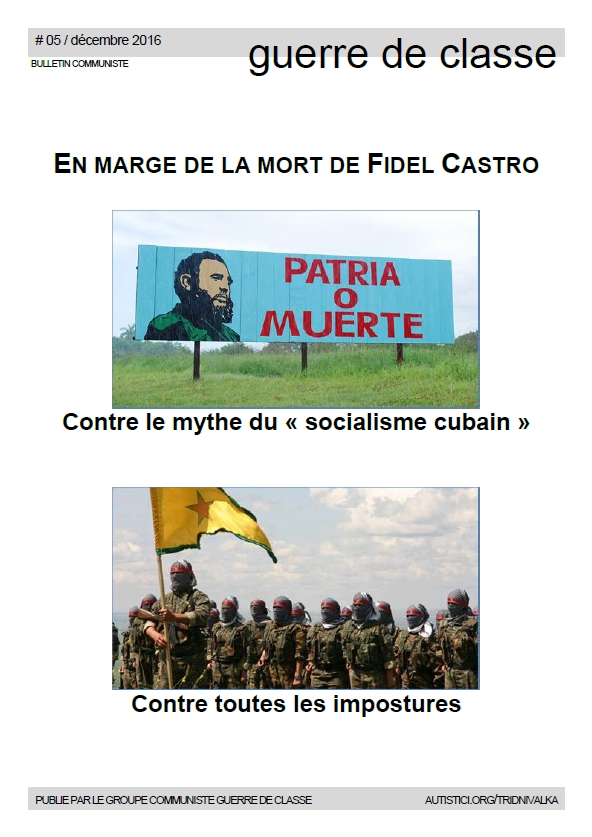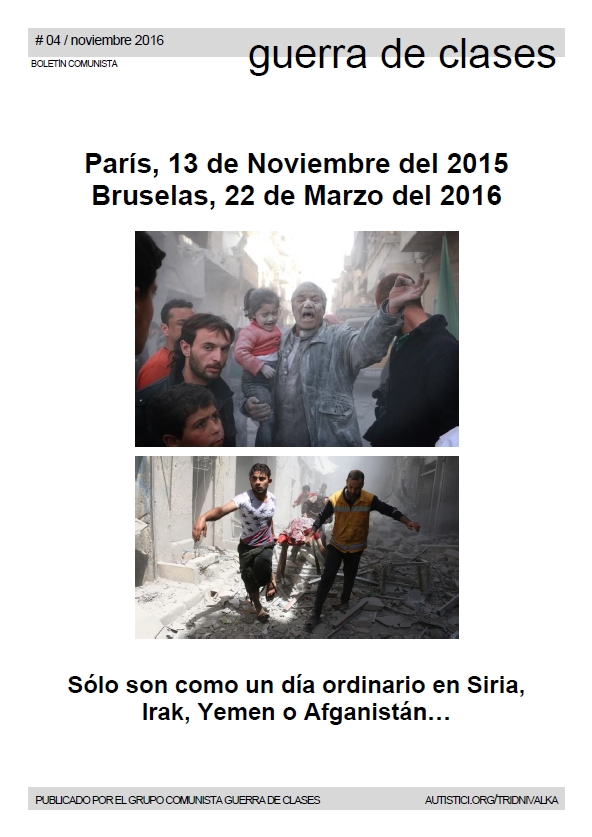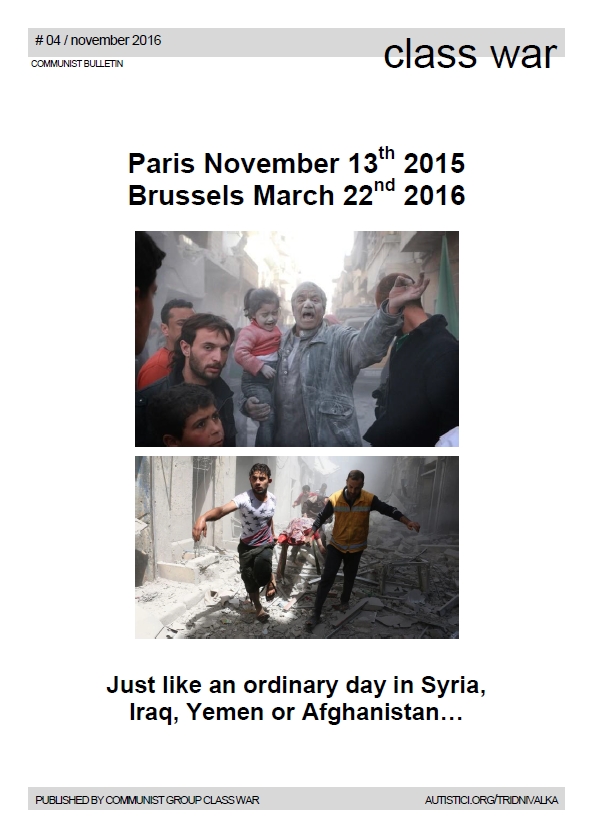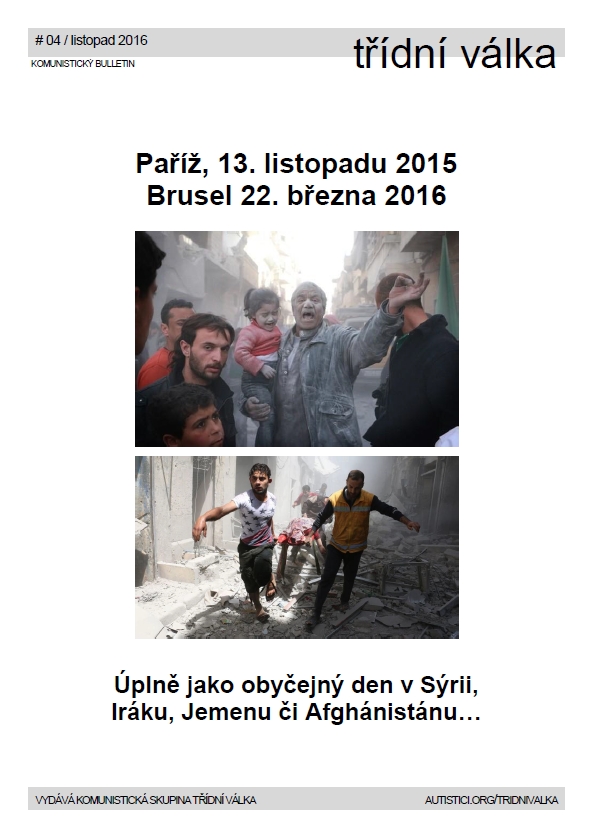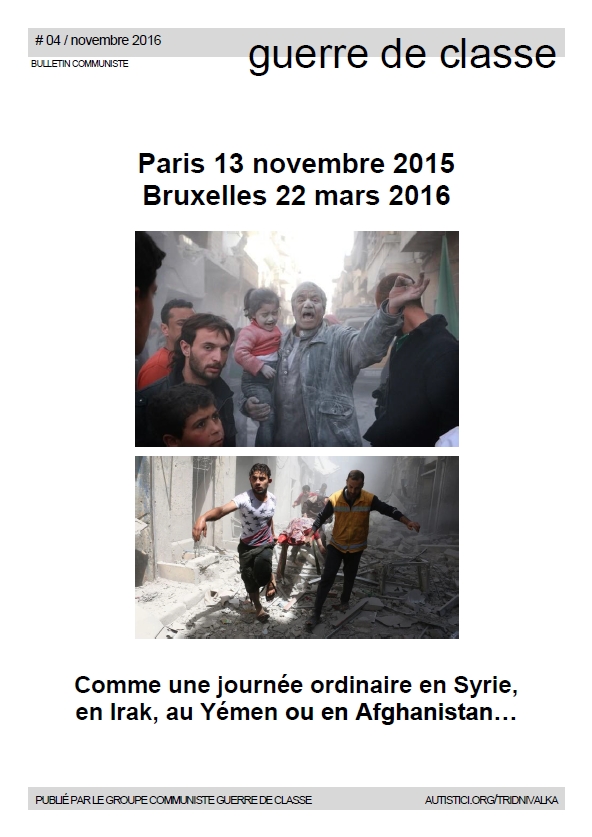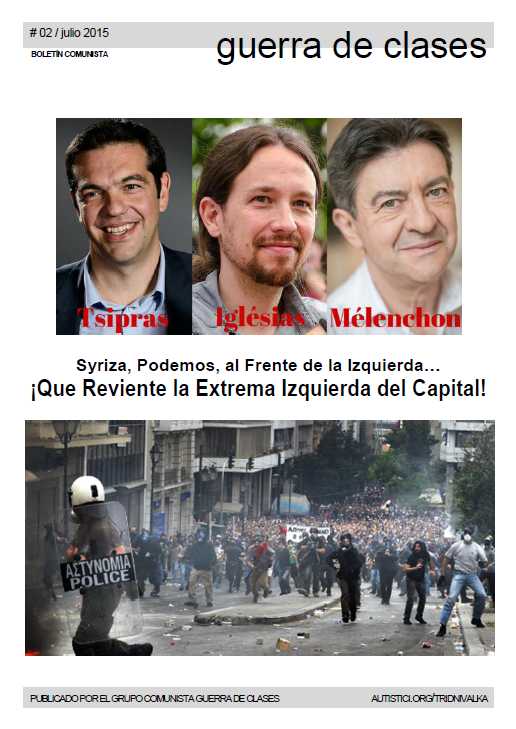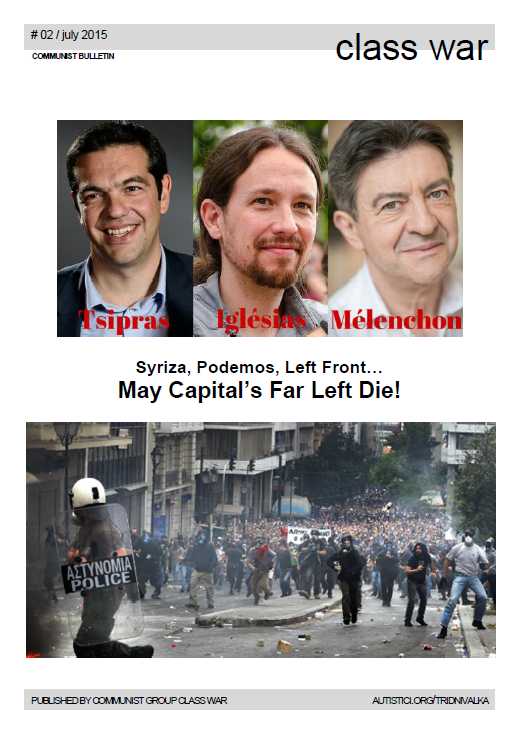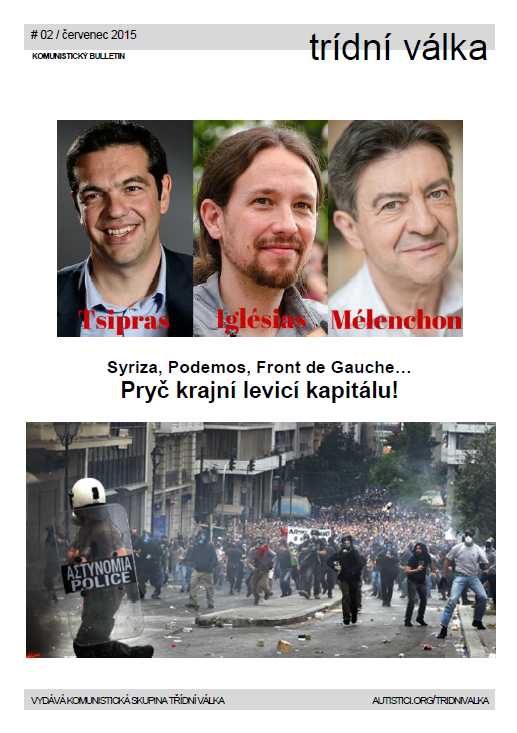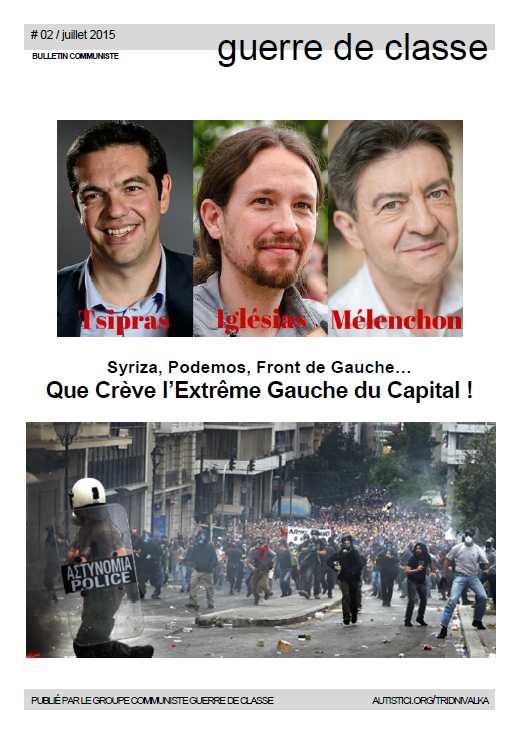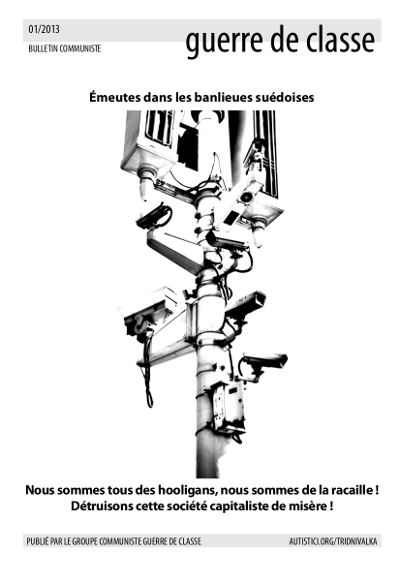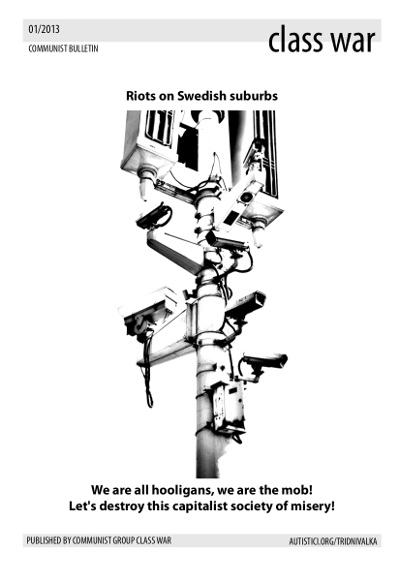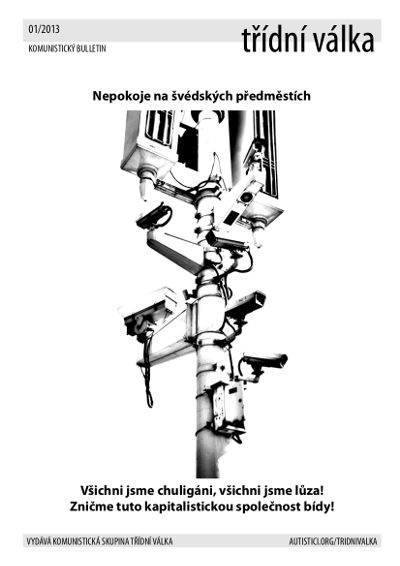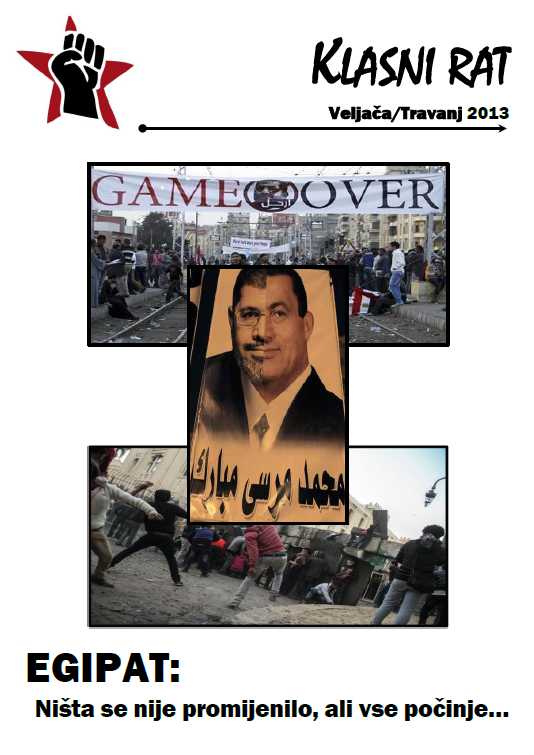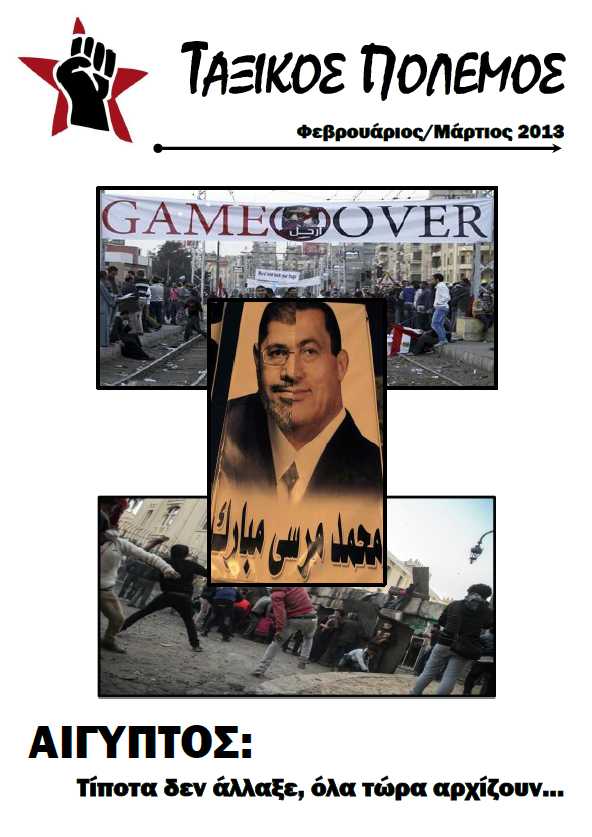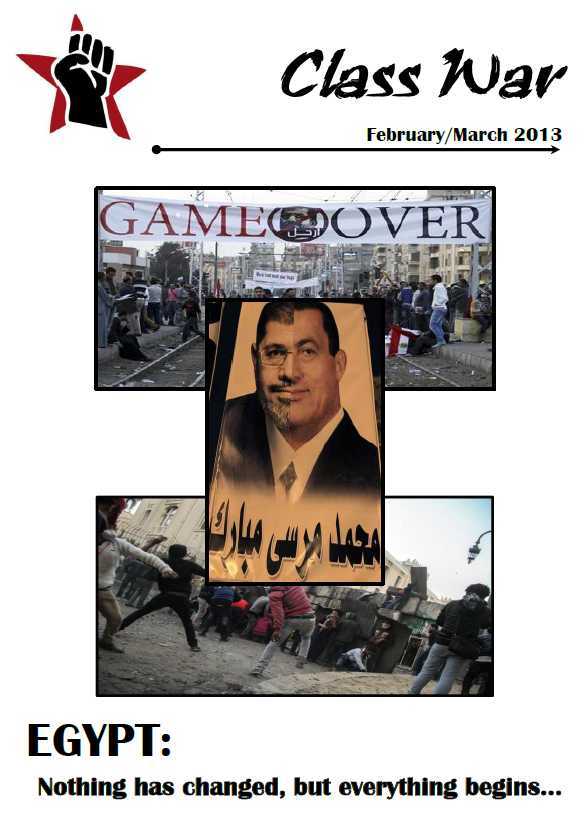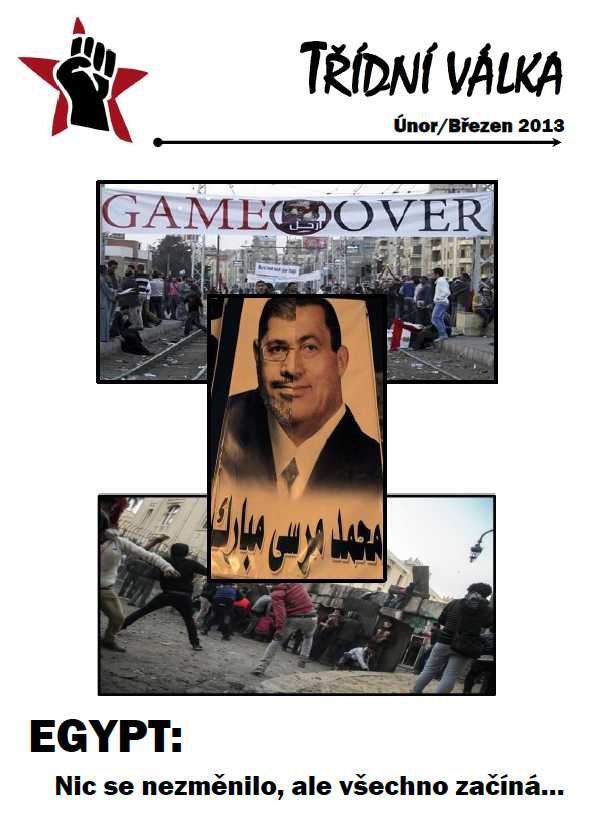Proletarian struggle, it is not just Greece in December 2008, even if, at least in the Euro-Atlantic space, this rebellion is, by its depth and scope of its conscious as well as unconscious social critique, the furthest reaching expression of our class in the last several decades. Proletarians struggle today as well as yesterday all over the world, because in spite of their local differences they are in the position of an exploited class, and they all share basically same misery of surviving in capitalism.
Economy versus human needs
With arrival of the crisis, capitalism continues to grin its disgusting face at us and brings further increase of exploitation, misery and alienation.1 It is nothing new: exploitation of our labour power, draining our life energy, this is what the capitalist society is based upon. The aim of production is not satisfaction of human needs, but creation of profit for the class owning means of production – the bourgeoisie. We are all exploited, because for our work we receive only a wage with lesser value than is value of goods we produced. Everything that we produced over the value of our own labour power becomes surplus value. This, after deduction of investments into means of production (be it a lathe, an agricultural tractor or a computer server), transforms itself into the profit of the capitalist. From this surplus value extracted from our living labour grows the amount of accumulated wealth of the bourgeoisie, which in turn invests it into further production. We are forced to spend our wages on the same goods that we produced at work, because it is the only possible way how to survive. By this we in fact allow the realisation of profit of “our dear capitalist”. Every day, again and again, we are driven into alienated and alienating process of production by merciless logic of creation of profit. This ever repeating cycle constantly reproduces the class of owners buying the labour power (the bourgeoisie) and the class forced to sell its labour power (the proletariat).
But with capitalist development and increasing technologization of production, productivity of labour and thus increasing rate of exploitation, the capitalists are able to flood the market with ever-increasing amount of goods, with use of ever decreasing amount of labour power. This means that value of goods is decreasing. The bourgeoisie tries to avoid this while getting rid of redundant labour power and at the same time they seek to realise the same rate of profit by means of conquering new markets (for example by advertising) in order to sell more goods, because a potential of no market is unlimited. In this way capitalism inevitably leads to the general crisis of valorisation, like the one that the world is currently experiencing. After bankruptcies of banks, sacking of employees in industry and services as well, decrease of wages, destruction of supplies of unsold goods, closing of companies, comes. And for different factions of the bourgeoisie a war will sooner or later appear as the only way out of the crisis, because it allows them to destroy sufficient amount of value at sufficient pace, in order to restart economical growth again.
Human needs against economy
Life in the capitalist totality is nothing else but miserable surviving from day to day. Drained from our living energy at work, terrorized by the police, fed with styrofoam food, sacked from jobs, and with a perspective to be send to die in the name of homeland, nation, race, democracy or religion on this or that war front, when they become completely superfluous for Capital, proletarians rise up to enforce their human needs against needs of economy.
Today, life situation is worsening for many of us, while capitalists still drive their asses in luxury cars and feed us with appeals to fasten our belts and persuade us to agree with “necessary rationalisation of production” – sacking and decreasing wages. But sometimes such arrogance does not pay off to the bourgeois. As an example we can choose a banker, Fred Goodwin, from Royal Bank of Scotland whose luxury villa and limousine were damaged. Moreover, he received SMS threats claiming that it is just a beginning and that soon his house will burn with him being inside.
As struggles of last few years have shown us, for example in Bangladesh or Egypt,2 our class is not as dead as a bunch of bourgeois sociologists and/or experts at medial spectacle of TV NOVA tries to lie to us.
The same hold for a recent wave of wildcat strikes in the UK because of exclusion of local workers from reconstruction works taking place in plants of the British oil industry,3 where bourgeois media hand in hand with politicians and trade unions tried to depict the whole movement in nationalist dimensions of “job market competition”. Even if at first, striking workers themselves used slogans like “British jobs for British workers!”, in the process of struggle those were very quickly forgotten to make space to a much more internationalist class content. As an example could serve banners in Italian language, used by strikers, calling Italian workers, employees of a company carrying on the reconstruction, to join the strike. In several British towns there were also workers occupying closing down Visteon factories to enforce payment of compensation money and there is a lot of conflicts developing in civil service sector over cuts in the state budget.
As unrest is coming back into the hearth of “affluent” Europe (in the form of the December uprising in Greece), the bourgeoisie became scared and shitted in their pants. The president of France, Sarkozy, scared by Greek events, postponed his plans for an even greater impoverishment of young proletarians in France in the form of longer testing periods and school fees loans. Despite this, France did not avoid student protests, occupations of universities and high schools, which were often ended only by riot-cops. Further cuts in the budget and plans for privatisation of education enraged tens of thousands of students and teachers all over the Italy and caused wave of university occupations and some of them, despite efforts of student unions, led to the brawls with police.4
In French overseas departments Guadeloupe, Martinique, French Guiana and Reunion a general strike erupted against an unbearable rate of exploitation and totally paralyzed at least Guadeloupe and Martinique islands. It was accompanied by riots and looting, which the state had to suppress with police units sent from France. Finally, the bourgeoisie made the workers to resume work, but in return for roughly 30 percent increase in wages. The general strike resounded in France itself as well, where several solidarity demonstrations took place. Proletarians in France themselves, facing closures of factories and dismissing, start occupation strikes and take their bosses as hostages, in order to enforce their demands.
And the proletariat has been awaking elsewhere as well. In traditionally calm regions a wave of riots took place: in capital cities of Latvia and Lithuania, hundreds of workers clashed with police and satisfied their immediate human needs by looting shops. In this way, they were practically subverting everyday capitalist logic of exchange relations. Similarly, proletarians in Sophia, in a suburb of Malmoe or in Vladivostok showed clearly, what they think about fastening their belts and worsening of their living conditions. After fifty years, working class in Iceland, heavily struck by economical crisis, went to the streets and attacked parliament and police stations. In the country of 320 thousands inhabitants, more than 10 thousands of proletarians took part in everyday demonstrations that turned into clashes with the police.
What makes the world bourgeoisie very worried is the proletariat in the “workshop of the world” and “incoming global superpower”: “red” China. From speeches of global politicians one can feel how scared they are of the impact a large scale proletarian uprising in China could have on the worldwide proletariat. Official statistical bureaus of the Chinese state in a rare accord with western journalists observe a sharp increase in the number of riots and strikes erupting all around the country. Statisticians are talking about tens of thousands of “incidents” which demanded police intervention. For example, on the 19th of December 2008, at the time when the proletarian uprising was storming in Greece, in Longan city in North-Western China approximately 50 thousands of local residents and poor peasants from surrounding villages clashed with special police units because of state-planned appropriation of their land and demolition of their dwellings without any compensation. During the clash two local offices of the ruling Communist party of China were burnt to the ground as well as many government and police vehicles. But more than twenty demonstrators were literally beaten to death and over one hundred badly wounded by police batons.
A perspective?
Although the cause of all proletarian struggles is the same: the exploiting social relation, which capitalism is based upon, and which is the source of all contradictions and problems our class must face, it does not mean that struggling proletarians themselves are aware of this connection uniting their particular struggles all around the world and at the same time implicating their only possible positive overcoming – the communist revolution that destroys the class society and together with it finishes all exploitation, oppression, war and starvation. Only a global human community, where we will not be forced to sell our lives for a wage and where our relations will not be mediated by exchange, will allow us to be real human beings.
Unfortunately, today we have to state that, at least for now, proletarian struggles around the world happen somehow coincidentally at the same time but without mutually relating to each other. As we already said before, most of proletarian struggles, we were talking about, consist of short-lived, isolated and quickly defeated violent clashes of a handful of proletarians with the police or equally limited wildcat strikes. These struggles are often limited by lots of democratic and nationalist illusions, but in some moments they get out of control of Social Democracy (in the forms of trade unions or political parties) and practically disrupt social peace. These isolated expressions of class struggle speedily die and give the bourgeoisie enough space to counter-attack – police repression, control, medial massage. But generally, they are a proof that the proletariat is struggling for its interests, whether there is a crisis or not.5
However, it is necessary to say, that a weight of bourgeois domination and spectacle fall even on the shoulders of us, communists. Although we, as communist militants, are consciously internationalists and we understand the class society in its global scope, it is very difficult to break through the barrier of media fairy tales, language and censorship. It is especially strong in cases of news about struggles in so-called “developing countries”, which are interpreted by bourgeois media in a way as ably as possible concealing their class content.6
Nevertheless, only when struggling proletarians in different parts of the world recognise themselves in their class brothers and sisters on the other side of the planet, the communist revolution has a chance to be successful. If this situation is coming close, we can not say. Hopefully, the impact of the global economic crisis on the living conditions of the proletariat will serve as a unifying factor that will help our class to refuse false consciousness and to fraternize despite of all bourgeois divisions.
Footnotes:
1 Separated from means of subsistence, we are forced to sell our labour power to Capital in alienated and alienating process of production, and this alienation is conveyed into all other aspects of our lives, our relations with other human beings and our consciousness. Bourgeois media regularly bring news about “mad shooters”, “incomprehensible massacres” committed by “mentally ill people” and suicides of “unsuccessful losers”, which they describe as excesses in order to mask their roots in inhumane totality of the class society.
2 Reaching from militant wildcat strikes of thousands of workers especially in textile, oil, construction and mining industry and agriculture (despite unlawfulness of any strike in Egypt and several years of martial law in Bangladesh), riots in the streets against high prices of food and petrol, militant struggles of immigrants from Sub-Saharan Africa against deportations in Cairo to a mutiny of Bangladeshi rifles, which claimed lives of eighty bourgeois in uniforms
3 Construction workers were very quickly joined by workers from almost all British refineries and several power plants, incinerators, a chemical factory and steelworks.
4 At the time when this text was written, second wave of occupations, much more militant and autonomous from social democratic structures took place. Occupations were running on in many big cities all around the Italy. In Rome, demonstrators occupying Sapienza University were seriously fighting the police in the streets, in Naples occupations started to leave the framework of universities. At the same time, university occupations in France, where students wanted to pass to another grade without exams, just with an average mark, while teachers wanted to abolish the whole semester, were running as well.
5 We would like to refuse a false question, so popular amongst the ultra-leftists, if the best time for class struggle is during capitalist conjuncture, because workers are in a better position as capital needs their labour power, or a time of crisis, because they must be first dying of hunger before they realize their exploitation.
6 An especially disgusting example could be the region of so-called Black Africa, where all the terror committed against our class brothers and sisters by capital is presented as a proof of primitivism of “local nations”.
